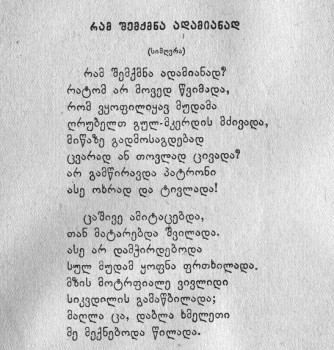Georgian (ქართული ენა) literature is one of the most ancient traditions in the world. The beginning of its history dates back to the fourth century, to the epoch when the country was converted to Christianity. Poetry as an important part of Georgian literature also can be traced back to the very beginning of Georgian writing and even farther, to the ancient layers of pagan folk poetry. In spite of this, Georgian poetry is Christian in its essence as is Georgian literature. The oldest genre of Georgian poetry is hymnography, followed by the plentiful diversity of lyrical genres like elegy, ode, epic, and sonnet. Throughout its history Georgian poetry looks like an open cultural construction: it undergoes different aesthetic epochs and cultural contexts, standing at the crossroads of Western and Eastern civilizations; overcomes the difficulties of Russian colonialism and Soviet totalitarianism; and constructs the strong models of post-colonial consciousness.

The translations which are presented for American readers do not express all the diversity of Georgian poetry, but only some considerable stages of its development. However, these translations display the stylistic variety of Georgian poets belonging to different historical epochs. Nikoloz Baratashvili’s (1817-1845) verse is significant with Romantic mood; it activates one of Romanticism’s key ideas and most enduring legacies – the assertion of nationalism, which is so important for Georgian people, conquered by the Russian empire; the quest for national identity becomes one of central themes of his Romantic art and philosophy. Ilia Chavchavadze (1837-1907) and Akaki Tsereteli (1840-1915), as representatives of classical Georgian Realism, are even more concerned with the colonial situation of Georgia, problems of Georgian national identity and social establishment, its political strength and future perspectives; however, Akaki Tsereteli’s verse is respectively disposed between the real and imaginary layers of creative mind. Vazha-Pshavela’s (1861-1915) verse, as well as his philosophy in general, is thematically and emotionally completed with Georgian mythological and folkloric tradition; his poetical language in keeping with styles of Georgian mountain speech; his aesthetics is simultaneously linked with the ancient roots of Georgian culture, as well as with main currents of 20th century Georgian poetry. Titsian Tabidze (1893 -1937) and Paolo Iashvili (1894-1937) are brilliant representatives of Georgian Symbolism – one of the general trends of 20th century Georgian poetry; their verses are marked by the innovative Modernistic mood and taste, expressing the intellectual and representative freedom of new Georgian poetry. Galaktion Tabidze’s (1891-1959) poetry is unanimously considered as a the heyday of 20th century Georgian literature; his poetry is an eminent expression of the tragic clash that arises in conditions of a totalitarian regime between the artist and the actual context and shows the painful aspiration of the poet towards the artistic freedom; in his verses new themes are declared, original rhythms and remarkable metaphors are developed. Ana Kalandaze (1924-2008) is a very special figure in the history of Georgian poetry; she is a bright representative of the process of liberalization of the poetical discourse from the totalitarian influence; in her verse the delicate voice of woman is elegantly united with the traditional Georgian sense of national consciousness; Dato Barbakadze and Giorgi Lobjanidze are representatives of the young generation of Georgian poets, involved in the complicated process of searching self in a pragmatic world outside. Generally, thematic and psychological complexity is a principal marker of contemporary Georgian poetry; it is thorny, but very interesting and miscellaneous at the same time. Young Georgian poets are looking for innovative forms of self-presentation, absorbing main trends of the world poetical process. But they are powerfully connected with Georgian national literary and folk tradition, which has survived with grace throughout the centuries.
~Dr. Irma Ratiani
Director of the Shota Rustaveli Institute of Georgian Literature
Selected poems in Georgian and English (translations by Dr. Irma Ratiani and Catherine Fletcher) in PDF format.
Click on the links below to hear audio of the poems in the original Georgian read by Valerian Sikhuashvili.
- Why Was I Created Human Vazha Pshavela, “Why Was I Created Human”
- Tovli:Snow Galaktion Tabidze, “Snow”
- Anna Kalandadze Anna Kalandadze, “You Are So Deep, Georgian Sky”
- Nature Dato Barbakadze, “Nature”



